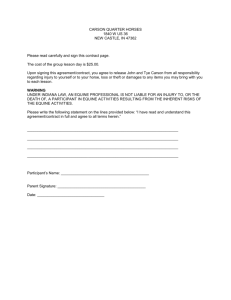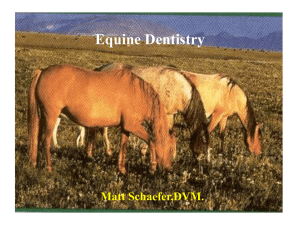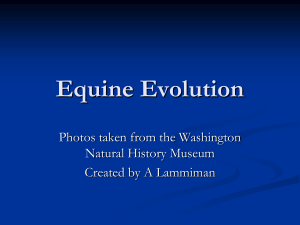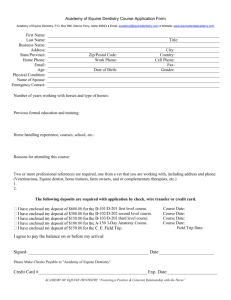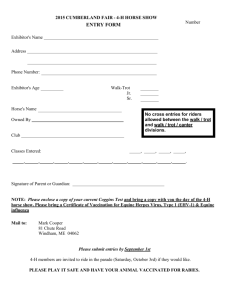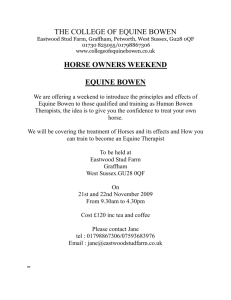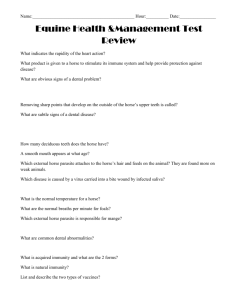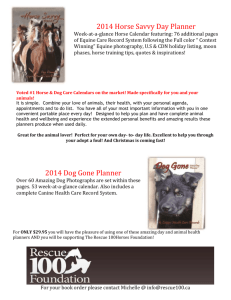MCVG Equine Newsletter - Moray Coast Vet Group
advertisement
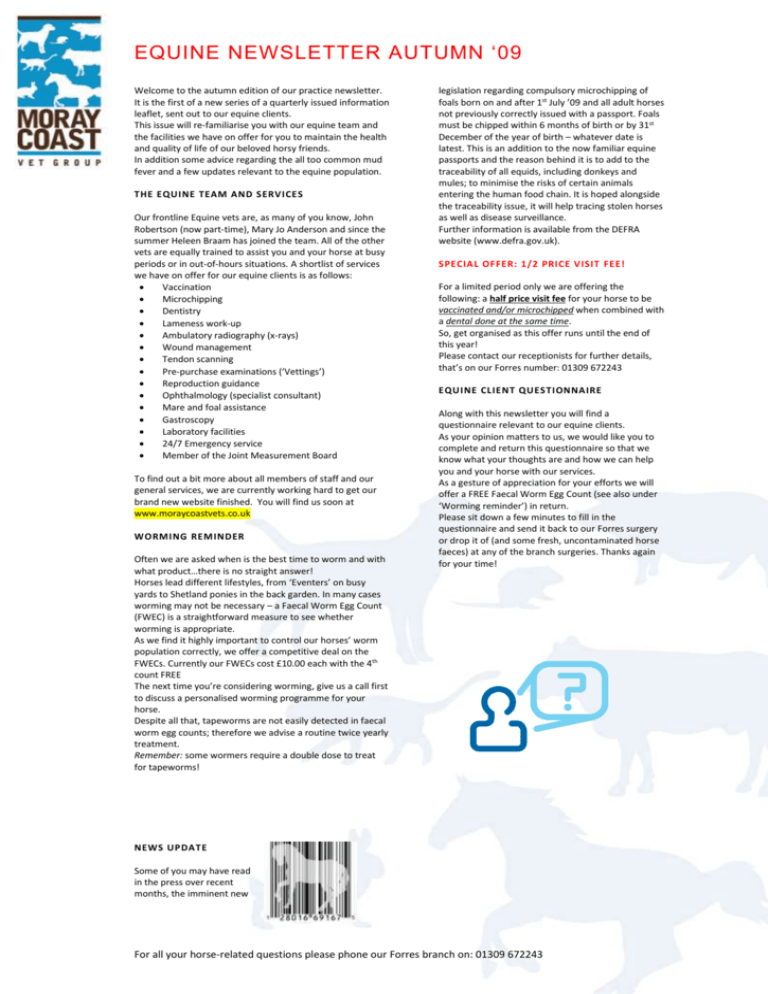
EQUINE NEWSLETTER AUTUMN ‘09 Welcome to the autumn edition of our practice newsletter. It is the first of a new series of a quarterly issued information leaflet, sent out to our equine clients. This issue will re-familiarise you with our equine team and the facilities we have on offer for you to maintain the health and quality of life of our beloved horsy friends. In addition some advice regarding the all too common mud fever and a few updates relevant to the equine population. THE EQUINE TEAM AND SERVICES Our frontline Equine vets are, as many of you know, John Robertson (now part-time), Mary Jo Anderson and since the summer Heleen Braam has joined the team. All of the other vets are equally trained to assist you and your horse at busy periods or in out-of-hours situations. A shortlist of services we have on offer for our equine clients is as follows: Vaccination Microchipping Dentistry Lameness work-up Ambulatory radiography (x-rays) Wound management Tendon scanning Pre-purchase examinations (‘Vettings’) Reproduction guidance Ophthalmology (specialist consultant) Mare and foal assistance Gastroscopy Laboratory facilities 24/7 Emergency service Member of the Joint Measurement Board To find out a bit more about all members of staff and our general services, we are currently working hard to get our brand new website finished. You will find us soon at www.moraycoastvets.co.uk WORMING REMINDER Often we are asked when is the best time to worm and with what product…there is no straight answer! Horses lead different lifestyles, from ‘Eventers’ on busy yards to Shetland ponies in the back garden. In many cases worming may not be necessary – a Faecal Worm Egg Count (FWEC) is a straightforward measure to see whether worming is appropriate. As we find it highly important to control our horses’ worm population correctly, we offer a competitive deal on the FWECs. Currently our FWECs cost £10.00 each with the 4th count FREE The next time you’re considering worming, give us a call first to discuss a personalised worming programme for your horse. Despite all that, tapeworms are not easily detected in faecal worm egg counts; therefore we advise a routine twice yearly treatment. Remember: some wormers require a double dose to treat for tapeworms! legislation regarding compulsory microchipping of foals born on and after 1st July ’09 and all adult horses not previously correctly issued with a passport. Foals must be chipped within 6 months of birth or by 31st December of the year of birth – whatever date is latest. This is an addition to the now familiar equine passports and the reason behind it is to add to the traceability of all equids, including donkeys and mules; to minimise the risks of certain animals entering the human food chain. It is hoped alongside the traceability issue, it will help tracing stolen horses as well as disease surveillance. Further information is available from the DEFRA website (www.defra.gov.uk). SPECIAL OFFER: 1/2 PRICE VISIT FEE! For a limited period only we are offering the following: a half price visit fee for your horse to be vaccinated and/or microchipped when combined with a dental done at the same time. So, get organised as this offer runs until the end of this year! Please contact our receptionists for further details, that’s on our Forres number: 01309 672243 EQUINE CLIENT QUESTIONNAIRE Along with this newsletter you will find a questionnaire relevant to our equine clients. As your opinion matters to us, we would like you to complete and return this questionnaire so that we know what your thoughts are and how we can help you and your horse with our services. As a gesture of appreciation for your efforts we will offer a FREE Faecal Worm Egg Count (see also under ‘Worming reminder’) in return. Please sit down a few minutes to fill in the questionnaire and send it back to our Forres surgery or drop it of (and some fresh, uncontaminated horse faeces) at any of the branch surgeries. Thanks again for your time! NEWS UPDATE Some of you may have read in the press over recent months, the imminent new For all your horse-related questions please phone our Forres branch on: 01309 672243 ‘TIS THE SEASON FOR … MUD FEVER! aim to avoid situations leading to prolonged wetting of limbs. Sad but true. Here is some information on this very common condition and some tips for dealing with it. A widely seen and potentially very painful and costly condition seen all year round for some but more commonly it starts to flare up at this time, right through winter and spring. Mud fever (‘cracked heels’, ‘grease heel’) is caused by the bacterium Dermatophilus congolensis which lives in the soil, able to survive for several years and takes any given opportunity to invade the skin. This can happen if the natural barrier formed by the skin becomes comprised by: Constant wetting Dry cracked skin from frequent wet-dry cycles Cuts/abrasions Bandaging of wet legs The same bacterium is responsible for rain scald which affects the back and croup. Infection is usually seen around the coronet, pastern and fetlocks; white hairs are more prone, as are those with a lot of feathering. At first it can be recognised by the formation of scabs in the affected area but more severe infections will ooze serum, cause swelling up the leg and be very painful to touch. There are numbers of tried and tested ways to manage mud fever, with no set rules it is generally what works best for you, however there are few pointers to help: Keep the legs clean and dry, thereby removing the cause. No matter how good the treatment, nothing will work unless the skin is clean and dry Remove scabs. No cream will penetrate scabs and bacteria will be in abundance beneath them. Take great care though as this will not only be an uncomfortable process for the horse, further damage could occur to the skin below. The skin and scabs can be softened in a number of ways: Apply an Animalintex™ poultice for 24hrs Apply a generous amount of emollient cream such as Sudocream™, then lightly wrap in clingfilm, covered by a stable bandage for up to 3 days. Be prepared that this process may need to be repeated more than once to fully remove the scabs The more severe cases may require sedation for scab removal Hair should be clipped from affected areas to allow the skin to breathe Use of Hibiscrub™ after scab removal, if left to soak for up to 10 minutes will provide antibacterial activity and therefore reducing the bacteria available to cause secondary infection Use an antibacterial cream, for example Flamazine™ cream (stocked by us), over the entire area once the scabs are removed and the skin is cleaned Apply a barrier cream, e.g. Veterinus Derma gel™ (also stocked by us), before turn out, however wash this off thoroughly when brought in and allow the skin to dry This newsletter has been sent to our equine clients who have been visited by one of our vets in the last 18 months. If the information we have is out of date or you would prefer not to receive newsletters please either ring reception or e-mail: adminforres@moraycoastvets.co.uk Many thanks. MCVG CONSULTATION TIMES (By Appointment) FORRES Greshop Industrial Estate 01309 672243 Mon-Fri 9am - 6.30pm Sat 9am - 12pm NAIRN St Ninian Rd 01667 453161 Mon-Fri Sat LOSSIEMOUTH 68 Queen St 01343 815335 Mon 9am - 6.30pm 12.30pm – 2.00pm Tue Wed Thursday Fri 10.30am - 11.30am 5pm - 6.30pm 1pm - 2pm 4pm – 6.30pm 5pm – 6.30pm 3pm - 4.30pm BALLOCH Culloden Rd 01463 794224 Mon/Wed/Fri Tue/Thu 2pm - 3pm 5pm - 7pm If the affected limb is swollen, painful to touch or oozing serum or pus then systemic antibiotics will be required so please contact us for a visit. Prevention better than cure … If your horse is prone or your fields are particularly muddy, consider using a barrier cream preventatively before the skin’s defences are comprised and For all your horse-related questions please phone our Forres branch on: 01309 672243
